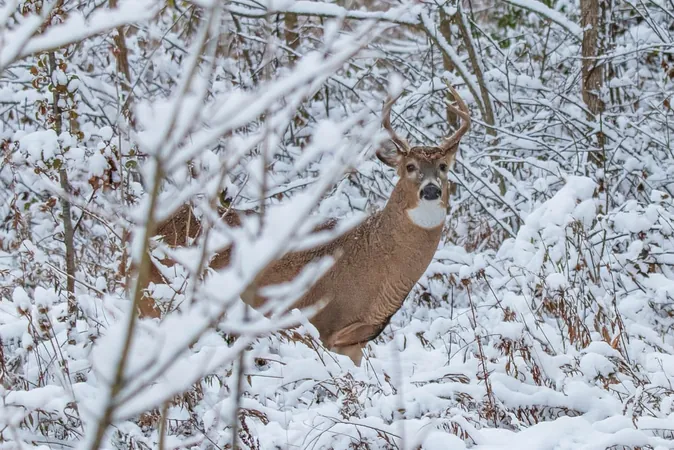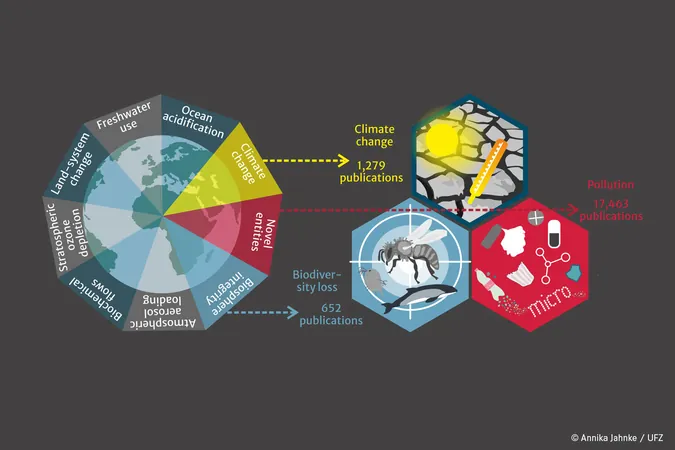
Third Fatal Case of Chronic Wasting Disease Confirmed in Deer Near Cranbrook – What You Need to Know!
2024-11-22
Author: William
In a concerning development for wildlife enthusiasts and hunters alike, a third case of Chronic Wasting Disease (CWD) has been confirmed in the East Kootenay region. A white-tailed deer, harvested just last month south of Cranbrook, tested positive for this fatal neurological disease on November 20, as reported by the provincial government.
This latest case emerges just a stone's throw from the initial two cases confirmed earlier this year, highlighting a disturbing trend in the spread of CWD. The first two cases were detected through laboratory testing in February 2024—one involved a female roadkill whitetail deer, while the other was a mule deer harvested in the South Country area east of Lake Koocanusa.
Jesse Zeman, executive director of the B.C. Wildlife Federation, has raised the alarm, urging the provincial government to increase efforts in managing this wildlife disease. Zeman states, "CWD is becoming more prevalent since the detection of the first two cases, and communities like Cranbrook and Kimberley, which have high urban deer populations, are at risk.”
The call for action includes significantly reducing urban deer numbers in towns, stressing the need for dedicated funding to address the growing problem of CWD effectively.
It is important to note that all confirmed CWD cases have occurred within a designated management zone that encompasses 14 wildlife management units throughout the Kootenay region. This area is the focus of ongoing monitoring and data collection to mitigate the risk of further disease spread.
Zeman emphasizes the proactive role hunters play, stating, “Hunters have been actively engaged in sampling and turning in deer heads to assist in identifying disease prevalence. Testing turnaround times have also improved with increased hunter cooperation.”
To curb the spread of CWD, the province has instituted mandatory submission of samples within the management zone and implemented carcass transportation restrictions that prohibit moving deer carcasses outside of the designated areas. Earlier this year, the provincial government also issued wildlife permits for special harvesting in areas where the initial positive cases were identified, aiming to collect additional samples for further testing.
Chronic Wasting Disease is a prion disease affecting cervids, including deer, moose, and elk, causing detrimental effects on the central nervous system. Once infected, there is no cure, and the disease is universally fatal to affected animals. Although CWD has not been shown to affect humans or livestock, public health experts advise against consuming animals that test positive for the disease.
Infected animals can appear healthy even while harboring the disease, making CWD especially insidious. Visible symptoms, when they do manifest, can include weight loss, drooling, poor coordination, and overall lethargy.
As the situation develops, wildlife officials and concerned citizens alike must collaborate to combat CWD and protect the wildlife populations in British Columbia. Hunters and community members need to stay informed and vigilant—because the future of our wildlife may depend on it.
Stay tuned for further updates as authorities continue to address the threat of Chronic Wasting Disease!









 Brasil (PT)
Brasil (PT)
 Canada (EN)
Canada (EN)
 Chile (ES)
Chile (ES)
 España (ES)
España (ES)
 France (FR)
France (FR)
 Hong Kong (EN)
Hong Kong (EN)
 Italia (IT)
Italia (IT)
 日本 (JA)
日本 (JA)
 Magyarország (HU)
Magyarország (HU)
 Norge (NO)
Norge (NO)
 Polska (PL)
Polska (PL)
 Schweiz (DE)
Schweiz (DE)
 Singapore (EN)
Singapore (EN)
 Sverige (SV)
Sverige (SV)
 Suomi (FI)
Suomi (FI)
 Türkiye (TR)
Türkiye (TR)